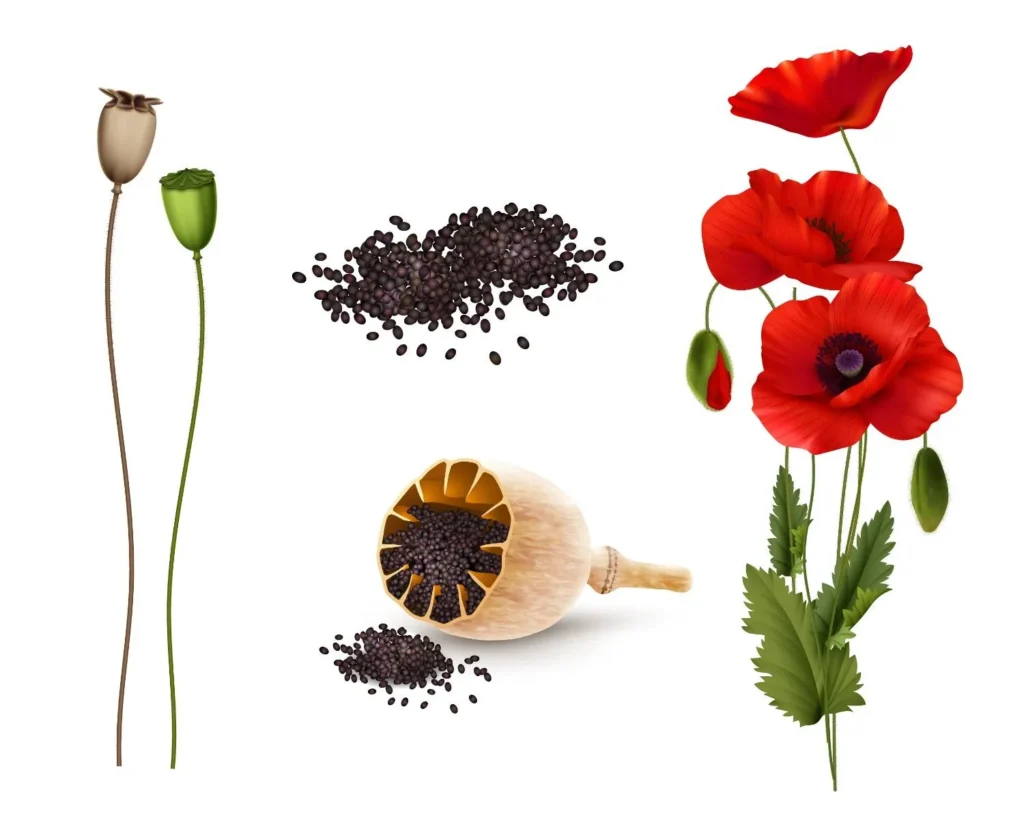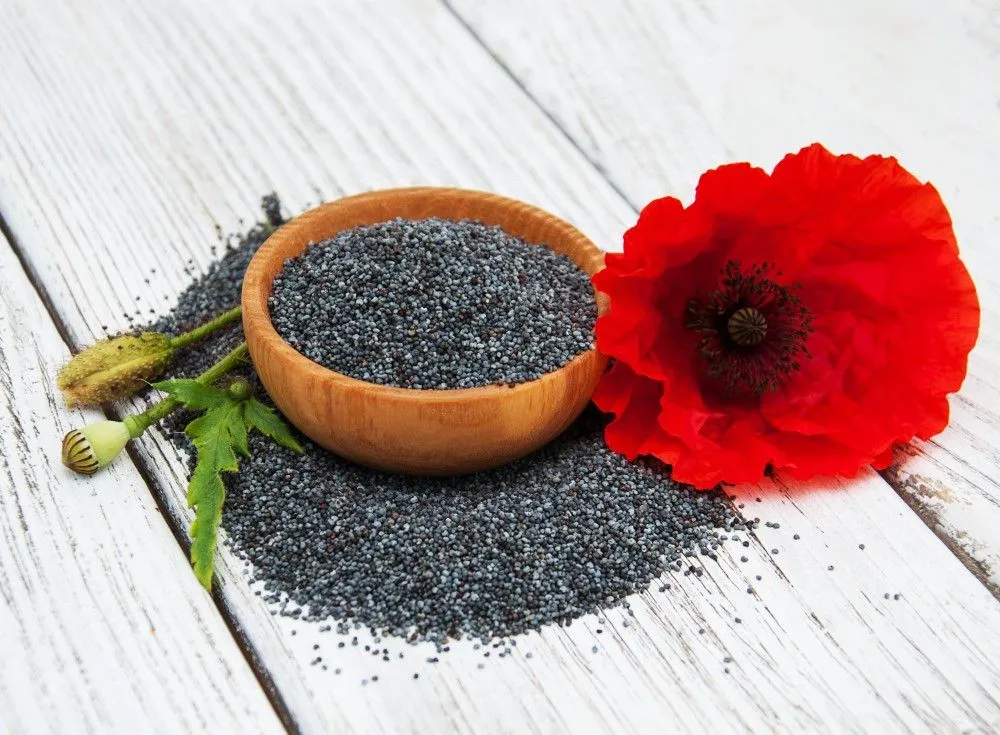Table of Contents
Introduction: The Aroma of Heritage
The kitchen fills with warmth and anticipation as spices roast in a heavy-bottomed pan. Among the sharp fragrance of ajwain and the earthy notes of cumin, another seed quietly crackles — the poppy seed, or khus khus. Though small and ivory-colored, these seeds carry centuries of stories: of ancient civilizations, royal kitchens, Ayurveda, and home remedies passed from one generation to another.
To most people, poppy seeds are just a cooking ingredient — a thickener for gravies or a sprinkle over bread. But in truth, these tiny seeds hold a far richer legacy. They are symbols of prosperity in Europe, comfort food in Bengal, and medicine in Ayurveda. To understand them fully is to travel through time, culture, and tradition.

🌍 Different Names & Origin
Poppy seeds come from the plant Papaver somniferum, believed to have originated in the Mediterranean region and cultivated for over 3,000 years
Different Names Around the World:
- Hindi: Khus Khus
- Bengali: Posto
- Tamil & Kannada: Gasagase
- Telugu: Gasagasalu
- Malayalam: Kus Kus
- Persian: Khashkhash
- English: Poppy Seeds
- Latin: Papaver somniferum
Their spread was vast. The Egyptians mentioned them in medical papyri; the Greeks mixed them with honey in cakes; Romans used them in bread. From there, the seeds traveled along trade routes to Asia, finding a permanent home in Indian kitchens and Ayurvedic medicine.
🌱 Types of Poppy Seeds
Not all poppy seeds are alike. They differ in color, flavor, and culinary use:
- White Poppy Seeds (Indian / Asian Poppy Seeds)
- Mild and nutty flavor
- Widely used in Indian cooking, especially in curries, posto dishes, and desserts.
- Blue Poppy Seeds (European Poppy Seeds)
- Slightly sweeter taste
- Commonly sprinkled on breads, cakes, and bagels in Europe and North America.
- Oriental / Turkish Poppy Seeds
- Larger and oil-rich variety
- Primarily used for oil extraction and industrial purposes.
Each type reflects the culinary culture it belongs to — from the creamy gravies of India to the crusty breads of Europe.
🌿 Health Benefits of Poppy Seeds
Poppy seeds are not just flavorful but incredibly nutritious. They contain essential minerals, healthy fats, and antioxidants that support health in many ways:
- Improves Digestion – Their fiber content aids bowel movements and soothes the digestive tract.
- Bone & Dental Health – Rich in calcium, magnesium, and phosphorus for strong bones and teeth.
- Promotes Restful Sleep – Naturally calming, they help reduce stress and induce sleep.
- Supports Heart Health – The seeds contain healthy fats (omega-6 fatty acids) that regulate cholesterol.
- Boosts Skin & Hair Health – Their antioxidant-rich oils nourish skin and strengthen hair.
- Enhances Energy – High in protein and healthy fats, they act as an energy booster.
- Lactation Support – Traditionally given to nursing mothers to stimulate milk production.
⚠️ Possible Harms & Side Effects
While poppy seeds have numerous benefits, they also come with risks if misused:
- Excessive Sedation: Large quantities may cause drowsiness due to alkaloid traces.
- Allergic Reactions: Rare, but some may experience skin rashes or irritation.
- Risk of Contamination: Improperly cleaned seeds may contain opioid residues.
- Drug Test Issues: High consumption may sometimes lead to false-positive results for opioids.
- Not for Infants: Babies should not be given poppy seeds, as their systems are too sensitive.
✅ Pros & ❌ Cons of Poppy Seeds
| Pros | Cons |
|---|---|
| Nutrient-rich (calcium, iron, zinc, protein) | Overconsumption can cause drowsiness |
| Improves digestion & sleep | Risk of contamination with opium alkaloids |
| Supports bone and dental health | Can trigger allergies in sensitive individuals |
| Culinary versatility across cultures | May interfere with certain medical tests |
| Used in Ayurveda for calming & cooling | Not suitable for infants or excessive daily use |
⚖️ Legal Status of Poppy Seeds
The poppy plant (Papaver somniferum) is also the source of opium, leading to strict regulations worldwide. However, poppy seeds themselves are legal in most countries, as they contain negligible amounts of narcotic alkaloids after processing.
- India: Legal for culinary and medicinal use.
- Europe & USA: Legal, widely used in bakery products.
- Middle East: Restricted in some countries due to religious or narcotic concerns.
Thus, while poppy seeds are generally safe and legal, their trade and cultivation are carefully monitored.
🍲 Culinary Uses
Poppy seeds are versatile in kitchens across the globe:
- India: Ground into posto paste for curries, used in Mughlai gravies, sweets, and milk drinks.
- Europe: Sprinkled on breads, rolls, and pastries for crunch and flavor.
- Middle East: Blended into desserts, halwas, and festive dishes.
- Worldwide: Used as a thickener, garnish, or flavor enhancer in both sweet and savory recipes.
🌿 Poppy Seeds in Ayurveda
In Ayurveda, poppy seeds (khus khus) are described as:
- Rasa (Taste): Madhura (sweet)
- Virya (Potency): Sheetal (cooling)
- Effect on Doshas: Balance Vata and Pitta
Ayurvedic Benefits:
- Promotes sound sleep and reduces restlessness
- Relieves burning sensations and heat imbalances
- Strengthens body tissues and boosts stamina
- Supports lactating mothers
- Soothes the nervous system and calms anxiety
📊 Nutritional Value (Per 1 Gram)
| Nutrient | Value |
|---|---|
| Energy | 5.25 kcal |
| Protein | 0.18 g |
| Carbohydrate | 0.28 g |
| Fat | 0.42 g |
| Calcium | 14.5 mg |
(Values approximate)
✨Summary
Poppy seeds, humble yet mighty, are more than a garnish or thickener. They are living threads connecting Egyptian medicine, Greek breads, Roman feasts, Persian desserts, and Indian posto curries. Known by many names across regions, they symbolize prosperity, nourishment, and healing.
In Ayurveda, they are sweet and cooling, calming the body and mind. Scientifically, they are nutrient-dense, rich in calcium, protein, and healthy fats. Yet they also carry a word of caution: moderation is key.
In the end, poppy seeds remind us that sometimes the smallest things carry the greatest wisdom — flavor, health, culture, and history all packed into a tiny seed.

